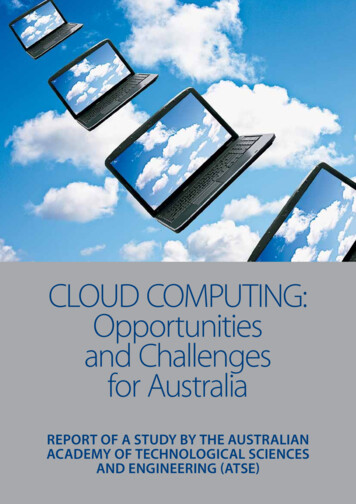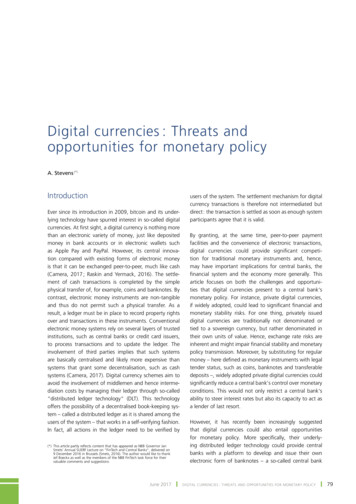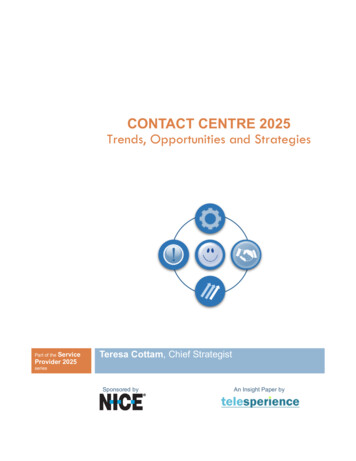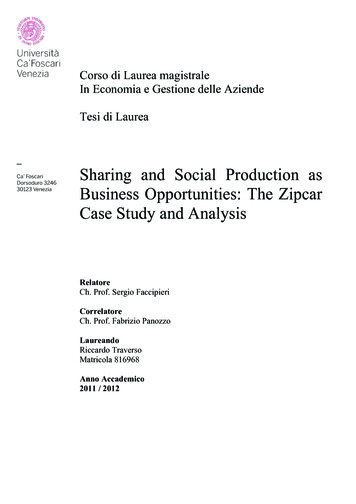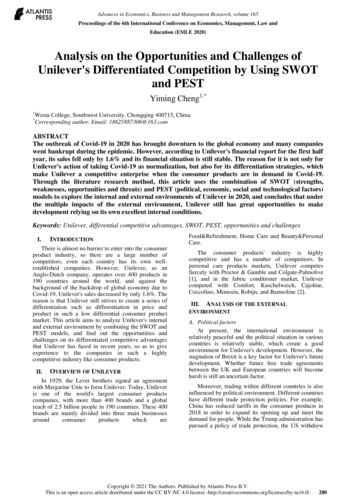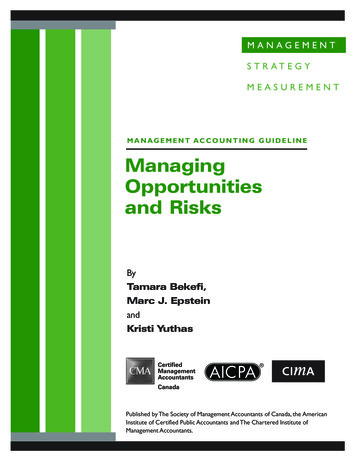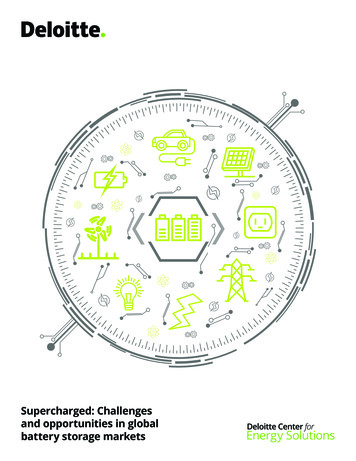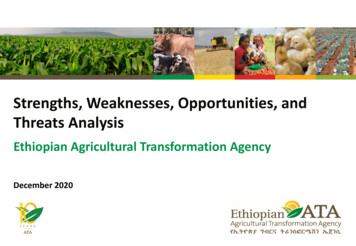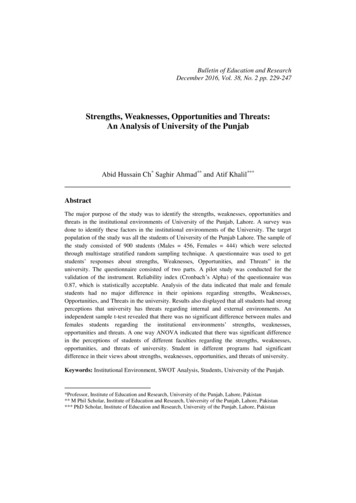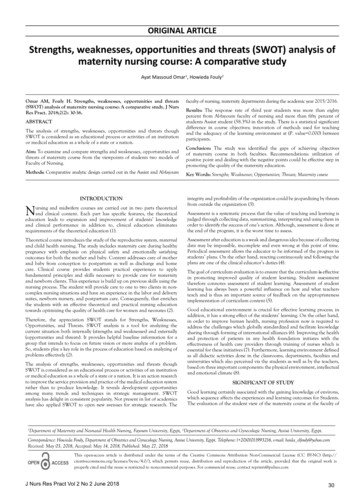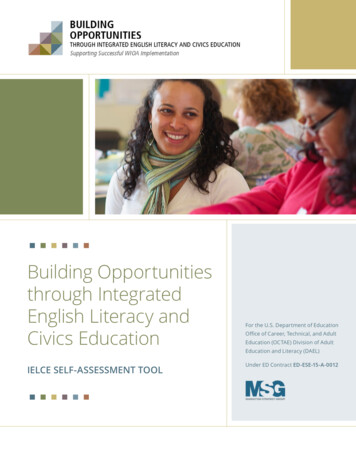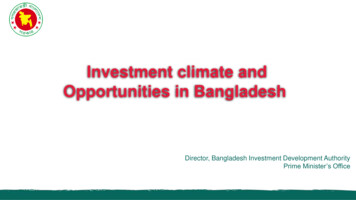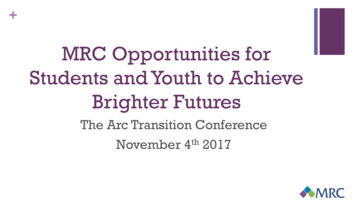
Transcription
MRC Opportunities forStudents and Youth to AchieveBrighter FuturesThe Arc Transition ConferenceNovember 4th 2017
What do you know about MRC?
Vocational Rehabilitation (VR) Employment Supports for persons with Disabilities, ages 16 and upDisability Determination Services (DDS) MRC is a state agency that provides services to personswith disabilities. There are three Divisions of MRC:Determines eligibility for federal Supplemental Security Income (SSI) and Social Security DisabilityInsurance (SSDI) benefits (funded by SSA)Community Living (CL) Brain Injury and Specialized Community Services (BISCS) Acquired Brain Injury, Money Follows the Person, and Home & Community Based Waiver Programs Protective Services Independent Living Programs Assistive Technology Program Home Care Assistance / Supported Living Services Consumer Involvement Program
MRC works with students and adults thathave many different types of disabilities.Our clients may have: Physical LimitationsEmotional DifficultiesLearning DifficultiesSubstance Abuse Difficulties Or a combination of the above.Our job is to help students: Understand their disability and some of the difficulties they may faceIdentify their strengths and things they are good at doing, or would like tobecome good atIdentify supports that they might need to reach their goals
How do Students get connected?Referrals can be made for Students: Direct from school to the local MRC office Via a Chapter 688 Referral If the student is at least 18 years old, he/she can also refer himself directly, or a parent/guardian canrefer them.When: Ideally: Two years prior to Graduation or Turning 22 Remember: MRC works with individuals with disabilities who range from 16 and up, with a vocationalfocusWhile on the processing list, Students should: Begin to think about jobs that are of interest to them Start to think about, and talk to the people who know them well about, services and supports theymight need to reach their goals Contact MRC if their address, telephone number, or any other contact information changes. Think about other people – teachers, doctors, family members- that are involved with them and whothey would like to include as they plan for reaching their vocational goals
MRC and High SchoolWhile in high school, MRC counselors work with the young adults tohelp them plan for the transition beyond high school. With students, VR counselors can: Coordinate with other adult service agencies and familiesProvide Vocational Counseling and GuidanceConduct Assessments/Vocational ExplorationRefer students for other ServicesCoordinate Pre-Employment Transition Services (Pre-ETS) OpportunitiesCoordinate and refer students and families to School Benefits Counselors for Work IncentivesPlanning and to the WIOA Family Support Planning for transition planningWithin the school/community, VR Counselors can: Coordinate with other adult service agencies and familiesParticipate in Parent Nights, Open House events or other school & community presentationsAttend IEP/other in-school meetings, as appropriate, to provide vocational transition consultationProvide schools with MRC transition marketing materials
Student-Youth Opportunities VR Counseling, Supports and Services Pre-Employment Transition Services Family Support Transition Planning Internships Supported Living Program Youth Leadership Forum/ Youth Leadership Network Independent Living Center- Projects Student Benefits Counseling Transition Pathway Services Demonstration Project
The VR Process Referral Processing List Intake & Application Eligibility Determination Plan Development (and ITP, if needed) Service Provision Case Closure Post-Employment Services
Determining A Vocational Goal Once found eligible for services, the MRC counselor will work with students todevelop vocational goal(s) and together with the student, will write the IndividualPlan for Employment (“IPE”). The IPE is a written document that outlines and reflects: The vocational goal All services that will be provided/needed to achieve the goal The time frame expected for the student to meet these goals, and The cost breakdown for the services the student will need. If the student has some job goals in mind, the MRC counselor will help themexplore their feasibility. If the student does not have clear career direction, the counselor may recommendthat they participate in career assessment testing at the office, or job explorationactivities through Pre-ETS Services.
Services and Supports in the IPEmay include: Vocational Guidance and Counseling Vocational Evaluations Interest and Aptitude Evaluations College or Job-Specific TrainingAssistance with building a Resume,Networking, and Interviewing Skills Assistance with applying for jobs andtalking to employers about support needs Accommodations at College (disabilityservices, tutoring) Assistive and/or Rehabilitation Technology Job Placement AssistanceJob Coaching/ Accommodations On theJobFollow-up and Referrals
Pre-ETS Services To be eligible to receive Pre-ETS services, a student must be: A current consumer of the MRC Vocational Rehabilitation (VR) Program, beingreferred from an MRC VR Area Office An enrolled high school student or a student enrolled in Post-secondaryeducation or training with a disability; and Within the Ages of 16 to 22Pre-ETS Services include: Work-Based Learning Experience Self-Advocacy/Mentoring Instruction Workplace Readiness Training Counseling on Enrollment inComprehensive Transition or PostSecondary Educational Programs Job Exploration Counseling
Pre-ETS Vendor: Highlight Center for Living & Working, Inc. It is the mission of CLW to empower all persons with disabilities to take an active to roles in their lives and in the communitythey live. TIP & TAP- Empower youth who are motivated and eager to be independent through the assistance of these programs.Transitional Internship Program (TIP) The TIP program provides a pre-employment comprehensive and hands on experience for students between the ages of 16-22 who are in highschool or post-secondary education with a disability who are motivated and seeking to successfully develop their employment skills for futurecompetitive employment. The TIP program is a paid internship that provides hands on work experience to develop basic employment skills such as soft and hard jobskills as well as the interactive/comprehensive workshops. Workshops are focused around specific topics such as: professionalism, work equate,appropriate communication, learning about accommodations, resume writing, etc. Who can apply: Youth between the ages of 16-22, in high school or post-secondary who has a disability, and is an active MRC consumer Requirements:Work the required hours within the allowed weeksAttend all six of the mandatory workshopsTwo MRC meetings with their counselor, once in the beginning and the end of the program
Transition to Adulthood Consumer directed program: Allows consumers to self direct the services they want toreceive. The program best benefits youth who are eager and motivated to be or gain independent livingskills. Who is eligible: Students who are in high school between the ages of 14 to 22, who have adisability and who have an IEP. 4 four core services: Information & Referral Skills Training Peer support Advocacy (self and group) Transition to Adulthood (TAP) acts as a bridge between other agencies, schools, families andespecially the students to ensure those who need additional support after high school has servicesin place to make for a smooth transition out of high school into independent living.
Young Adult Supported Living (T22)WHAT IS SUPPORTED LIVING?The Supported Living Programprovides ongoing services foryoung adults graduating from highschool or turning 22 years of age to liveindependently in the community.Students must live with:1.Primary Physical Disability &2.a Secondary (sensory, cognitive, or emotional)Disability which significantly impede on theindividual’s ability to manage their day-to-daylife.The program is built on the independent livingphilosophy which empowers consumers to maketheir own decisions about their lives, based oninformed choice.SERVICES INCLUDE: finding accessible housing managing: PCA program medication personal health finances household transportationrequesting adaptive equipmentaccessing educational, vocational, social &recreational opportunities self-advocacy
Young Leadership Forum (YLF) & Network (YLN)WHAT IS YLF?WHAT IS YLN? Annual multi-day conference for youth livingwith any type of disabilities during the summerorganized by PYD. The workshops and activities foster employmentreadiness, independence, systems and Hands-on groups/activities/discussions aboutindividual advocacy, peer networking, andcommunication, teamwork, community service,leadership skills.disability rights, career interests andemployment skills.Students can either apply as delegates (16-22)or peer leaders (18-25) Meetings are held in Boston (@BCIL),Springfield (@Stavros), Worcester(@CLW) &East Bridgewater (@IA). State-wide monthly meetings facilitated byEaster Seals to promote self-advocacy, selfawareness and life/employment skills for youngadults ages 14-26.
Transition To Adulthood Program (TAP)WHAT IS TAP?Through Independent Living Centers, the TAPprovides:ADLIBILCNSCA skills trainingBCILMWIL peer mentoringCLWNILP advocacy (individual & systems)CORDSCILIAStavrosto support students to develop the skills to liveindependently in the community of their choice. Theyear-around program builds self-confidence &resources to prepare students for life after highschool. TAP PROGRAMS:Ages 14-22
Benefits Planning Services For students receiving SSI/SSDI benefits, who need help understanding eligibilityand the impact work may have on their benefits: MRC has 3 Transition- focusedStudent Benefits Counselors across the state. Student Benefits Counselors are available to educate students and familiesregarding benefits and work incentives planning Goal is to ensure family support of student employment goals Student Benefits Counselors can arrange a school visit and individual meetings After High School graduation, Benefits Planning services are still available throughadult Benefits Planning Counselors
Benefits Planning Counselors Contact:Kathleen KellyNorth Region/Somerville(617) 776-2662Cell: Elsa JimenezSouth District/Braintree(781) 356-8840Cell: (857) ys BurgosWest Region/Springfield(413) 736-7296Xeimirillys.Burgos@MassMail.State.MA.US
Transition Pathway Services TransitionPathway Services Demonstration Project Grant Opportunityto explore, innovate, create RSA– Maine, Massachusetts, California, Vermont, & Maryland MRC– Springfield, Lawrence and Roxbury Area Offices 5 Years: 651 Students
Program Model & Sequence1st CareerDiscoveryTeamStudentenrollsIPEdevelopedFirst workexperienceStartStartTPS Services:TPScounseling, prevocationalETS training, peermentoring, travel training,assistive technology, familysupport, benefitscounseling*asse*Infor talentssmesciencentassessment3rd CareerDiscoveryTeam2nd obplacement
MRC After High SchoolOnce an individual has completed high school, MRC counselors will continue towork with the young adult in reaching his/her career goal. Upon graduating thefollowing services can be offered to assist with obtaining and maintainingemployment : Counseling and Guidance Consultation to Employers Interest and Aptitude Testing Job Placement Assistance College or Vocational Training Job Coaching Tutors Follow-up and Referrals Assistive and/or RehabilitationTechnology
Contact InformationContact your local VR Area tyservices/vocational-rehab/vr-area-offices/VR High School Coverage ntransition.html
Available Materials & ces-for-students-and-youth
What services do you believeto be most helpful?
Questions?Thank you!
MRC is a state agency that provides services to persons with disabilities. There are three Divisions of MRC: Vocational Rehabilitation (VR) Employment Supports for persons with Disabilities, ages 16 and up Disability Determination Services (DDS) Determines eligibility for federal Suppleme
